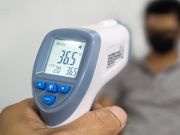WEDNESDAY, June 10, 2020 (HealthDay News) — In response to the coronavirus pandemic, many doctors’ offices and clinics have made changes to protect patients, care providers and staff.
As an example, here’s what’s being done at Penn State Health.
“When our patients first call to schedule an appointment at any of our offices, outpatient clinics or centers, they’ll be screened for COVID-19,” said Dr. Matthew Silvis. He’s vice chair of clinical operations in the family and community medicine department at the Hershey Medical Center in Hershey, Penn.
“This means being asked questions about their possible risk factors of having the coronavirus,” and possibly being asked for additional information over the phone to reduce the amount of paperwork needed at the time of the visit, Silvis said in a health system news release.
When patients arrive for their appointment, they will undergo further screening for COVID-19. They’ll be asked about possible exposure, any symptoms and they’ll have their temperature taken.
Patients will be required to wear masks that cover their nose and mouth before they can enter the facility. Doctors, nurses and office staff are screened daily for COVID-19 and wear face masks. Some may wear face shields for additional protection.
Other changes involve check-in, visitors, waiting areas and check-out.
Dr. William Bird, a senior vice president in Penn State Health Medical Group, said, “We’ve eliminated a lot of chairs in the reception area and spaced out the remaining chairs. Our understanding of COVID-19 continues to evolve and we now know that length of exposure is an important factor. So we’re also minimizing the time that people spend in waiting rooms, trying to get them from car to exam room as quickly as possible.”
Some practices may require patients to check in for their appointment from their cars and remain there until they can be seen by their doctor, while other practices may send patients straight to a patient room to wait for their provider there, Bird said.
In most cases, visitors are no longer allowed to accompany adult patients to their appointments or even enter waiting areas. In cases where someone is permitted to accompany an adult or child patient, that person is screened for COVID-19 and required to wear a mask, the doctors explained.
More information
The U.S. Centers for Disease Control and Prevention has more on COVID-19.
Copyright © 2026 HealthDay. All rights reserved.

